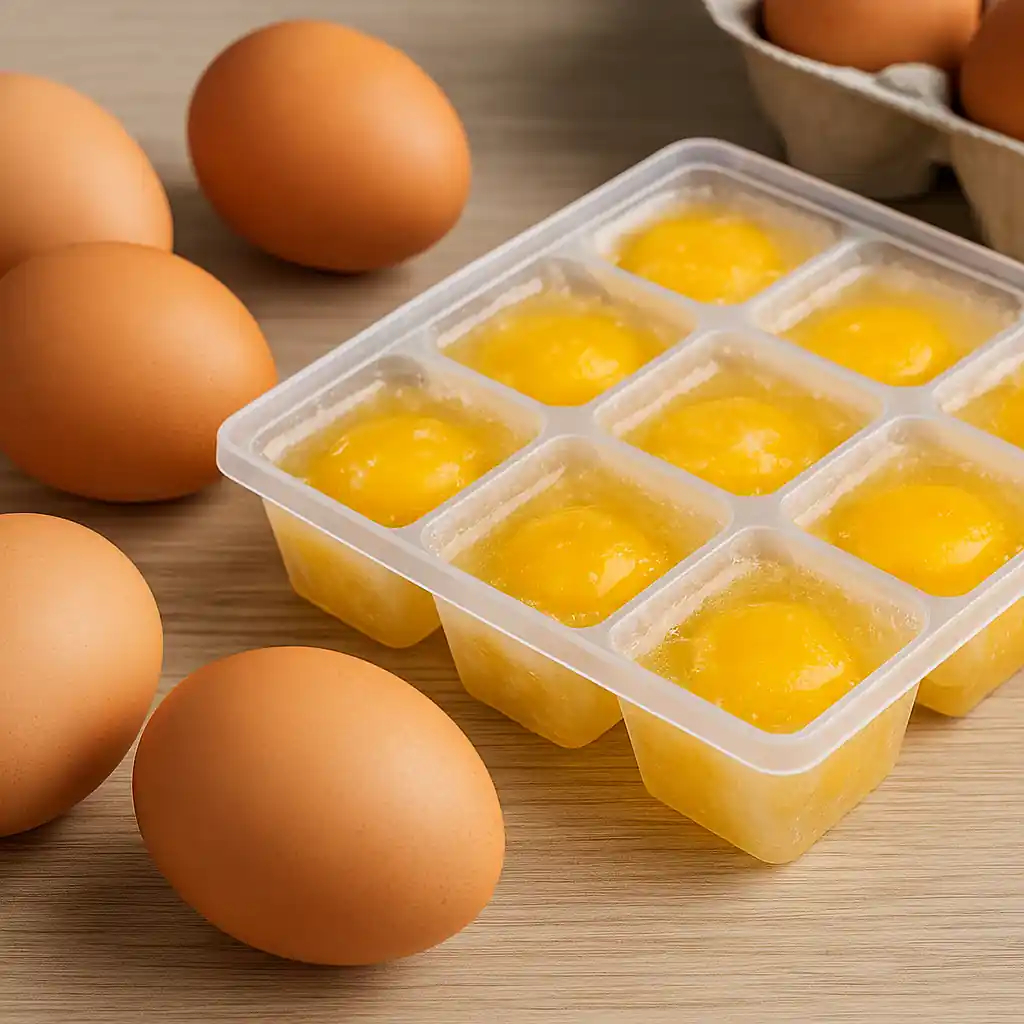Can You Freeze Eggs?
When it comes to kitchen storage, one of the most frequently asked questions is: can you freeze eggs? Whether you have a surplus of fresh egg supply at home, want to extend their shelf life, or prepare for baking and cooking in the future, learning how to freeze eggs the right way is essential. While eggs are a staple in both main dishes and desserts, they can spoil quickly if not stored properly. By understanding food safety guidelines, egg freezing methods, and the intended use of eggs once thawed, you can make the most of your supply without waste.
In this complete guide, we’ll cover everything you need to know about how to freeze your eggs, use frozen eggs, thaw them correctly, and ensure they remain safe and high-quality for cooking. We’ll also dive into recommendations from the American Egg Board, food safety managers, and common kitchen practices for freezing whole eggs, egg whites, and yolks.
Freeze Eggs
Freezing eggs is not only possible, but it can also be a practical solution for extending their shelf life and reducing waste. Eggs can be frozen in different forms, such as whole egg, egg white, or egg yolk, depending on their intended use later. According to food safety experts, eggs in the freezer can last up to one year when sealed tightly and stored properly.
Here’s how to freeze:
-
Break and separate the eggs if needed.
-
Decide whether you want to freeze whole eggs, yolks, or whites.
-
For yolks, extra steps are necessary because they tend to thicken or gel when frozen.
-
Always label the container with the number of eggs or egg whites and the date.
When you freeze eggs the right way, you’ll have a versatile ingredient that can be used for baking, scrambled eggs, or main dishes long after purchase.
Thaw
Thawing is just as important as freezing. Frozen eggs can never be thawed at room temperature because that creates conditions for bacterial growth. Instead, thaw frozen eggs overnight in the refrigerator or under cold running water for faster thawing.
Thawed frozen eggs should be thoroughly cooked to ensure food safety. As soon as they’re thawed, use them immediately in your intended recipe. Eggs should never be thawed and refrozen, as this can cause them to become tough and watery, reducing both quality and safety.
Use Frozen Eggs
Once you’re ready to use frozen eggs, make sure they fit the recipe’s intended use. Frozen eggs are perfect for baking or desserts, scrambled eggs, and other main dishes where texture changes are less noticeable.
Thawed egg whites will beat just as well as fresh, making them excellent for meringues and soufflés. Egg yolks or whole eggs can be used in custards, cakes, and sauces once properly thawed and mixed. Always remember to use within a short time after thawing and ensure they’re thoroughly cooked to maintain food safety.
Freeze Eggs the Right Way
Learning how to freeze eggs the right way requires a few extra steps. Simply cracking a fresh egg into a freezer-safe container is not enough for long-term storage. Depending on whether you’re freezing whole eggs, egg whites, or yolks, the preparation varies:
-
Freeze whole eggs
-
Break and beat the eggs until blended.
-
Pour into a standard ice cube tray or ice cube mold for portioning.
-
Once frozen until solid, transfer to a freezer-safe bag.
-
Label with the number of eggs and the date.
-
-
Egg whites
-
Separate yolks and whites carefully.
-
Place whites in a container or tray.
-
Freeze until solid and transfer to a bag.
-
Egg whites can be beaten after thawing, making them useful in baking.
-
-
Egg yolks
-
Yolks require sugar or salt to prevent thickening or gelling.
-
For every four yolks, add either 1/8 teaspoon salt or 1 ½ teaspoons sugar or corn syrup.
-
Stir into a yolk mixture, freeze until solid, and store sealed tightly.
-
Label with the number of yolks and whether salt or sweetener was used.
-
By adding sugar or salt, egg yolks can be frozen without becoming tough and watery. This makes them suitable for baking or main dishes depending on the chosen additive.
Fresh Egg vs. Frozen Egg
A fresh egg will always offer the best texture and taste. However, frozen eggs are an excellent alternative when you want to extend the shelf life of your supply of eggs. Eggs in the freezer can last up to one year, while fresh eggs in the refrigerator last only weeks.
Although thawed frozen eggs may not work well as fried or hard-boiled eggs, they perform perfectly in scrambled eggs, baking, sauces, and custards. As long as you freeze your eggs correctly and thaw them safely, the difference in taste is minimal.
Egg Freezing
Egg freezing is a broader concept that covers storing eggs in different forms, either for cooking purposes or for fertility preservation (though here, we’re focusing on food use). In the kitchen, egg freezing helps maintain a ready supply of eggs without worrying about expiration.
To follow food safety guidelines:
-
Always transfer to a freezer immediately after preparation.
-
Seal tightly to prevent freezer burn.
-
Label the container with the number of eggs and the date.
-
Use within one year for best quality.
Egg freezing allows households to store eggs for baking or desserts and main dishes without waste. With the right technique, frozen eggs can last longer than regular refrigerated eggs while still being safe and nutritious.
Thawed Frozen Eggs
Thawed frozen eggs should always be handled with care. Bacterial growth can occur if thawed eggs are left out at room temperature, so it’s crucial to thaw them only in the refrigerator or under cold water.
Keep in mind:
-
Thawed egg whites will beat well for recipes requiring volume.
-
Thawed egg yolks may be softer or thicker depending on how they were prepared before freezing.
-
Thawed frozen eggs should be thoroughly cooked before eating.
-
Use within two to three days once thawed.
As soon as they’re thawed, incorporate them into your recipes. Eggs should never be thawed longer than necessary, and they should never be refrozen.
Breaking and Separating Eggs Before Freezing
One of the most important steps when preparing to freeze your eggs is breaking and separating the eggs correctly. Shelled eggs should never be placed directly in the freezer, as the shell can crack and cause contamination.
Instead:
-
Crack eggs into a clean bowl.
-
Decide whether you want yolks and whites frozen together or separately.
-
Mix gently before transferring to a freezer-safe tray or container.
-
Add sugar or salt to yolks if storing separately.
By taking these extra steps, you ensure both food safety and better quality when using frozen eggs later.
Using Ice Cube Trays for Freezing
A popular method to freeze whole eggs, whites, or yolks is by using a standard ice cube tray. This allows for portioning, making it easier to thaw just the number of eggs you need.
Steps:
-
Lightly oil the tray to prevent sticking.
-
Pour the egg mixture into each compartment.
-
Freeze until solid.
-
Transfer to a sealed freezer-safe bag or container.
-
Label with the number of eggs per cube for accurate use later.
This method is especially convenient when baking or preparing smaller recipes. You can freeze until solid, then remove only what you need without thawing the entire batch.
Food Safety and Frozen Eggs
Food safety is a priority whenever you freeze eggs. According to food safety managers and the American Egg Board, eggs must be frozen properly, thawed safely, and cooked thoroughly to prevent bacterial growth.
Guidelines include:
-
Never freeze shelled eggs.
-
Always use airtight containers.
-
Label the container clearly with the number of yolks, whites, or whole eggs.
-
Store at 0°F (-18°C) or lower.
-
Thaw only in the refrigerator.
-
Cook thawed frozen eggs thoroughly before consumption.
Failure to follow these guidelines may result in eggs becoming unsafe or lower quality, such as becoming tough and watery after thawing.
Shelf Life of Frozen Eggs
Frozen eggs can last up to one year when stored correctly. This makes egg freezing a practical solution for anyone who buys eggs in bulk or wants to reduce food waste.
Shelf life guidelines:
-
Fresh egg in the fridge: 3–5 weeks.
-
Frozen eggs: up to one year.
-
Thawed eggs: use within 2–3 days.
Remember, while frozen eggs can last longer than regular refrigerated eggs, they should always be sealed tightly and cooked thoroughly for food safety.
Main Dishes and Baking with Frozen Eggs
Frozen eggs are best used in recipes where texture changes are less noticeable. This includes:
-
Scrambled eggs
-
Custards
-
Cakes
-
Sauces
-
Breads
-
Meringues (using thawed egg whites)
-
Desserts requiring yolks and whites
Because egg yolks can be frozen with sugar or salt, they can be tailored for either sweet baking or savory main dishes. Always check your intended use before freezing to add the correct ingredient (sweetener for desserts, salt for main dishes).
Looking to achieve perfectly cooked hard-boiled eggs every time? Try the popular Instant Pot 5-5-5 Method—5 minutes of high pressure, 5 minutes of natural release, and 5 minutes in an ice bath for easy peeling and consistent results.
Final Thoughts on Freezing Eggs
Yes, you can freeze eggs, and when done properly, it’s a safe and effective way to extend your supply of eggs. Whether you freeze whole eggs, egg whites, or egg yolks, the key steps involve breaking and separating the eggs, preparing yolks with sugar or salt, freezing until solid, transferring to a freezer-safe bag, and labeling the container.
By following food safety practices and recommendations from the American Egg Board, frozen eggs can last up to one year and remain a versatile ingredient for cooking. Always thaw overnight in the refrigerator, use within a few days, and cook thoroughly.
Freezing eggs the right way ensures you’ll always have eggs on hand for baking, scrambled eggs, main dishes, and desserts without worrying about waste or expiration.

